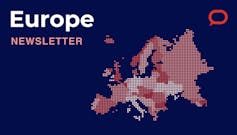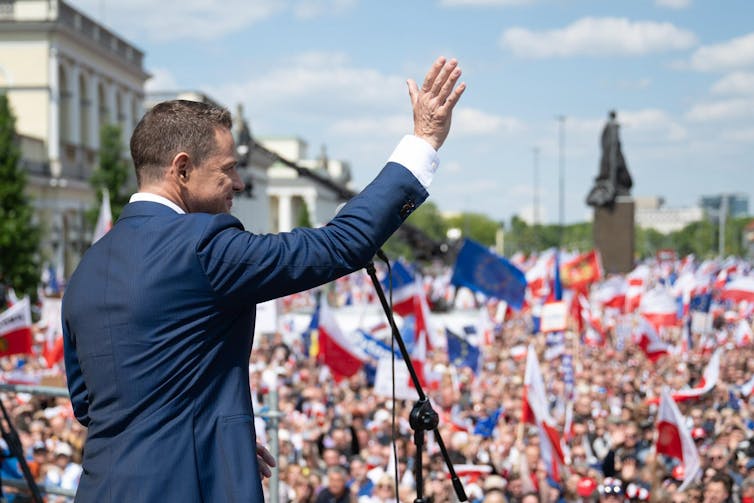Nawrocki’s narrow victory (50.89%) over Trzaskowski, the mayor of Warsaw and candidate of the government coalition, illustrates and reinforces the political polarisation of Poland and the rise of the populist “Trumpist” right in Central and Eastern Europe. Since the start of the war in Ukraine, there has been much speculation about whether Europe’s geopolitical centre of gravity is shifting eastwards. The Polish election seems to confirm that the political centre of gravity is shifting to the right.
A narrow victory
We are witnessing a relative erosion of the duopoly of the two major parties, Civic Platform (PO) and Law and Justice (PiS), whose leaders – the current Prime Minister, Donald Tusk, and Jarosław Kaczyński respectively – have dominated the political landscape for over twenty years.
Kaczyński’s skill lay in propelling a candidate with no responsibilities in his party, who was little known to the general public a few months ago, and, above all, who is from a different generation, to the presidency (a position held since 2015 by a PiS man, Andrzej Duda). Nawrocki, a historian by training and director of the Polish Institute of National Remembrance, has helped shape PiS’s memory policy. He won the second round, despite his troubled past as a hooligan, by appealing to voters on the right.
In the first round, he won 29.5% of the vote, compared to Trzaskowski’s 31.36%, but the two far-right candidates, Sławomir Mentzen (an ultra-nationalist and economic libertarian) and Grzegorz Braun (a monarchist, avowed reactionary, and anti-Semite), won a total of 21% of the vote. They attracted a young electorate (60% of 18–29-year-olds), who overwhelmingly transferred their votes to Nawrocki in the second round.

A weekly email in English featuring expertise from scholars and researchers. It provides an introduction to the diversity of research coming out of the continent and considers some of the key issues facing European countries. Get the newsletter!
Despite a high turnout of 71% and favourable votes from the Polish diaspora (63%), Trzaskowski was unable to secure enough votes from the first-round candidates linked to the governing coalition, including those on the left (who won 10% between them) and the centre-right (Szymon Hołownia’s Third Way movement, which won 5% in the first round).
A Tusk government struggling to implement its programme
There are two Polands facing each other: the big cities, where incomes and levels of education are higher, and the more rural small towns, which are more conservative on social issues and more closely linked to the Catholic Church.
The themes of nationhood – Nawrocki’s campaign slogan was “Poland first, Poles first” – family, and traditional values continue to resonate strongly with an electorate that has been loyal to PiS for more than twenty years. The electoral map, which shows a clear north-west/south-east divide, is similar to those of previous presidential elections and even echoes the partition of Poland at the end of the eighteenth century. The PiS vote is strongest in the part of the country that was under Russian rule until 1918. A more traditional Catholicism in these less developed regions, coupled with a strong sense of national identity, partly explains these historical factors.
The economic explanation for the vote is unconvincing. Over the past 25 years, Poland has undergone tremendous transformation, driven by steady economic growth. GDP per capita has risen from 25% to 80% of the EU average, although this growth has been unevenly distributed. Nevertheless, a relatively generous welfare state has been preserved.
Clearly, however, this growth, driven by investment from Western Europe (primarily Germany) and European structural funds (3% of GDP), does not provide a sufficient electoral base for a liberal, centrist, pro-European government.
It is precisely the government’s performance that may hold the key to Trzaskowski’s failure. Having come to power at the end of 2023 with a reformist agenda, Donald Tusk’s government has only been able to implement part of its programme, and it is difficult to be the candidate of an unpopular government. Conversely, the governing coalition has been weakened by the failure of its candidate.

Compte X de Rafal Trzaskowski
The main reason for the stalling of reforms is the presidential deadlock. Although the president has limited powers, he countersigns laws and overriding his veto requires a three fifth majority in parliament, which the governing coalition lacks.
The president also plays a role in foreign policy by representing the country, and above all by appointing judges, particularly to the Supreme Court. This has hindered the judicial reforms expected after eight years of PiS rule. It is mainly in this area that Duda has obstructed progress. The election of Nawrocki, who is known for his combative nature, suggests that the period of cohabitation will be turbulent.
What are the main international implications of Nawrocki’s election?
Donald Tusk is now more popular in Europe than in Poland; in this respect, we can speak of a “Gorbachev syndrome”. In Central Europe, the Visegrad Group (comprising Hungary, Poland, the Czech Republic, and Slovakia) is deeply divided by the war in Ukraine, but it could find common ground around a populist sovereignty led by Hungary’s Viktor Orbán. Orbán was the first to congratulate Nawrocki on his victory, followed by his Slovak neighbour Robert Fico. The Czech Republic could also see a leader from this movement come to power if Andrej Babiš wins the parliamentary elections this autumn. Nawrocki would fit right into this picture.
Since Donald Tusk returned to power, particularly during Poland’s EU presidency, which ends on 30 June, the focus has been on Poland’s “return” to the heart of the European process. Against the backdrop of the war in Ukraine and Poland’s pivotal role in coordinating a European response, the Weimar Group (comprising Paris, Berlin, and Warsaw) has emerged as a key player. Three converging factors have made this possible: the French president’s firm stance toward Russia; the new German chancellor, Friedrich Merz, breaking a few taboos on defence and budgetary discipline; and Donald Tusk, the former president of the European Council, regaining a place at the heart of the EU that his predecessors had abandoned. A framework for a strategic Europe was taking shape.
However, President Nawrocki, and the PiS more generally, are taking a different approach to the EU: they are positioning themselves as Eurosceptic opponents defending sovereignty. They are playing on anti-German sentiment by demanding reparations 80 years after the end of the Second World War and asserting Poland’s sovereignty in the face of a “Germany-dominated Europe”. The Weimar Triangle, recently strengthened by the bilateral treaty between France and Poland signed on 9 May 2025, could be weakened on the Polish–German flank.
As a historian and former director of the Second World War Museum in Gdansk and the Institute of National Remembrance, Nawrocki is well placed to exploit this historical resentment. He has formulated a nationalist memory policy centred on a discourse of victimhood, portraying Poland as perpetually under attack from its historic enemies, Russia and Germany.
While there is a broad consensus in Poland regarding the Russian threat, opinions differ regarding the government’s desire to separate the traumas of the past, particularly those of the last war, from the challenges of European integration today.
Memory issues also play a prominent role in relations with Ukraine. There is total consensus on the need to provide military support to Ukraine, under attack: this is obvious in Poland, given its history and geography – defending Ukraine is inseparable from Polish security. However, both Nawrocki and Trzaskowski have touched upon the idea that Ukraine should apologise for the crimes committed by Ukrainian nationalists during the last war, starting with the massacre of more than 100,000 Poles in Volyn (Volhynia), north-western Ukraine) by Stepan Bandera’s troops.
Alongside memory policy, Nawrocki and the PiS are calling for the abolition of the 800 zloty (190 euros) monthly allowance paid to Ukrainian refugees. Poland had more than one million Ukrainian workers prior to the war, and more than two million additional workers have arrived since it started, although around one million have since relocated to other countries, primarily Germany and the Czech Republic.
Prior to the second round of the presidential election, Nawrocki readily signed the eight demands of the far-right candidate Sławomir Mentzen, which included ruling out Ukraine’s future NATO membership. Playing on anti-Ukrainian (and anti-German) sentiment, alongside Euroscepticism and sovereignty, is one of the essential elements of the new president’s nationalist discourse.
A Central and Eastern European Trumpism?
Certain themes of the Polish election converge with a trend present throughout Central and Eastern Europe. We saw this at work in the Romanian presidential election, where the unsuccessful far-right nationalist candidate, George Simion, came to Warsaw to support Nawrocki, just as the winner, the pro-European centrist Nicușor Dan, lent his support to Trzaskowski. Nawrocki’s success reinforces an emerging “Trumpist” movement in Eastern Europe, with Viktor Orbán in Budapest seeing himself as its self-proclaimed leader. A year ago, Orbán coined the slogan “Over there (in the United States), it’s MAGA; here, it will be MEGA: Make Europe Great Again”. The “Patriots for Europe” group, launched by Orbán last year, is intended to unify this movement within the European Parliament.
American conservative networks, through the Conservative Political Action Conference (CPAC), a gathering of international hard-right figures, and the Trump administration are directly involved in this process. Shortly before the presidential election, Nawrocki travelled to Washington to arrange a photo opportunity with Trump in the Oval Office.
Most notably, two days before the election, Kristi Noem, the US Secretary of Homeland Security, was dispatched on a mission to Poland. Speaking at the CPAC conference in Rzeszów, she explicitly linked a vote for Nawrocki to US security guarantees for Poland:
“If you (elect) a leader that will work with President Donald J. Trump, the Polish people will have a strong ally that will ensure that you will be able to fight off enemies that do not share your values. […] You will have strong borders and protect your communities and keep them safe, and ensure that your citizens are respected every single day. […] You will continue to have a U.S. presence here, a military presence. And you will have equipment that is American-made, that is high quality.”
“Fort Trump”, that is how the outgoing President Andrzej Duda named the US military base financed by Poland after a bilateral agreement was signed with Donald Trump during his first term in office, in 2018. Similarly, the US House Committee on Foreign Affairs sent a letter to the President of the European Commission accusing her of applying “double standards”, pointing out that EU funds had been blocked when the PiS was in power, and claiming that European money had been used to influence the outcome of the Polish presidential election in favour of Trzaskowski. The letter was posted online on the State Department website. Prioritising the transatlantic link at the expense of strengthening Europe was one of the issues at stake in the Warsaw presidential election.
CPAC is playing a significant role in building a Trumpist national-populist network based on rejecting the “liberal hegemony” established in the post-1989 era, regaining sovereignty from the EU, and defending conservative values against a “decadent” Europe. Beyond the Polish presidential election, the goal seems clear: to divide Europeans and weaken them at a time when the transatlantic relationship is being redefined.




